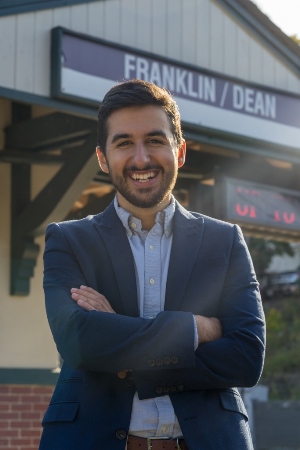Cobi's Vision for the Future of Franklin
My vision for the future of Franklin has three main tenets: education, economic development, and smart and appropriate growth.
 Franklin remains, and should remain, a Town for families and the best way to aid the next generation of Franklin residents is to strongly invest in their education. Our children literally are the Future of Franklin. Prioritization of education – which includes sufficient budgeting for counseling services – breeds stronger community members, attracts regional attention, improves the home value of existing residents, and further encourages families to town. Simply put: feeding the brain is a no-brainer.
Franklin remains, and should remain, a Town for families and the best way to aid the next generation of Franklin residents is to strongly invest in their education. Our children literally are the Future of Franklin. Prioritization of education – which includes sufficient budgeting for counseling services – breeds stronger community members, attracts regional attention, improves the home value of existing residents, and further encourages families to town. Simply put: feeding the brain is a no-brainer.
The Town can improve in both their attraction of new business and support of current businesses. Development of a clear New Business handbook can help potential businesses to navigate the permitting process. A focus on mixed-use properties (with retail on the street level and housing above) can ensure that growth in the local supply of services is met with an equal or greater growth of local demand. Engagement of Dean College students in town initiatives can strengthen a valuable partnership and encourage collegiate students to patronize town businesses and even stay after graduation. Finally, there is a need to prioritize attracting services in demand over competing institutions. A few examples of services in demand:
- Entertainment: The loss of Ficco’s bowladrome and even Zoetrope theatre have left a gap in family entertainment options.
- Affordable local food options: We’ve lost popular sandwich shops, soda fountains, and even a hot dog stand over the years, while frequent turnover of recent chains suggest a lack of local buy-in.
- Night life: We recently lost two town pubs and stand to offer more options to enthusiastic Dean students and Franklin residents. The breweries – especially the successful launch of 67 Degrees – have been a great step.
- Upscale dining: We recently lost the beloved Incontro, despite the MAPC market study highlighting that many go to Patriot Place for their nicer meals.
- Book shops: We recently lost the Squire Book Shop, despite demand for a bookshop again being highlighted in the market study.
- Festivals: The loss of St. Rocco’s – a true Franklin staple – was heartbreaking and the popularity of the Harvest Fest and Strawberry Stroll suggests room for further festivities.
Appropriate growth expands upon smart growth principles to add an element of fiscal responsibility. In order for us all to reap the benefits of municipal services – like infrastructure improvements, educational programming, and recreational opportunities – we must recognize that the pot needs to grow. Steady town growth is critical to growing this pot, but must be conducted responsibly.
Smart growth practices – which include, among other things, mixed land use, compact building design, walkable neighborhoods, distinctive community features, land preservation, re-purpose of existing buildings, and a variety of housing and transportation choices – ensure development patterns have long-term sustainability and aid in the protection of a healthy living/working environment for community members.
The current sprawl of Franklin, which heavily influences community behavior, is unsustainable. Currently, 78 percent of Franklin residents commute to work alone in their car! Franklin has opportunities to re-purpose historic mills, factories, and schools within walking distance from the commuter rail for a variety of uses and housing options. Thinking long-term, Franklin can work toward developing around multiple retail/housing clusters, enabling a large share of Town residents to live within walking distance of essential services and public transportation access. Expanding shared roads and extending the Rail Trail will further enable sustainable transit methods, even opening an opportunity for a local bike share.
But sustainable living is more than smart development. The recent Municipal Energy Aggregation initiative leverages collective bargaining power to improve residents’ financial security (through consistent and reduced energy bills) while dramatically reducing their carbon footprint. Franklin should consider using the structure to also reward local purchasing of renewable energy production, increase the share of New England -based Renewable Energy Credits, and even create a fund for energy efficiency projects. Meanwhile, I commend Franklin’s recent win of $30,000 in Green Communities grant money for the purchase of electric vehicles and charging stations. The town can become a regional leader in sustainability by continuing to seek opportunities for energy efficiency, renewable power generation, grid modernization, and alternative transportation projects like this both within and outside the Green Communities program. In addition to notoriety and a moral imperative, these initiatives employ local workers and save the community members money in the (not-so-) long-run.
